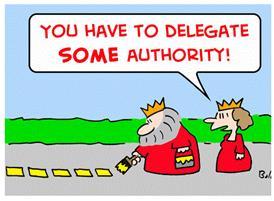 I’ve been fortunate to work with many very good leaders over the years. Those who have been most successful have worked hard to surround themselves with good people. They also know that it takes more than having good people around you—it’s about tapping into and developing that talent that makes the difference.
I’ve been fortunate to work with many very good leaders over the years. Those who have been most successful have worked hard to surround themselves with good people. They also know that it takes more than having good people around you—it’s about tapping into and developing that talent that makes the difference.
Enough Already – Delegate (or Just Let Go!)
Author: Diane Hamilton, Date: 5/9/2013Why Did You Become a Manager?
Author: Paul Dillenburg, Date: 5/1/2013Many employees become managers out of necessity. They were great individual contributors so their organizations’ promote them into a position that requires them to manage others. For the employee, one day you’re responsible for your individual results, the next you’re responsible for the results of others.
Through our coaching interactions we often ask, “why did you become a manager?” or “why should your direct reports follow you?” Seemingly easy questions, but difficult to answer the more you reflect on them.
Treat Everyone as a Game Winning Player
Author: Diane Hamilton, Date: 4/11/2013I’m a big college basketball fan. I love March Madness and despite the experts discussions about how the game is hard to watch today (for a variety of reasons), I enjoy the pageantry and competition. You may not be a Louisville fan, but you can’t deny the coaching prowess of Rick Pitino. Elected into the Basketball Hall of Fame on the same day he became the first coach to win national championships at two universities, Pitino is also no stranger to the concept of leadership.
Take Time to Appreciate
Author: Diane Hamilton, Date: 3/28/2013 Snowstorms…spring thaw…freezing rain. Huge fluctuations in weather are quite common in the Midwest. If you’ve lived or traveled in this area you are well accustomed to it.
Snowstorms…spring thaw…freezing rain. Huge fluctuations in weather are quite common in the Midwest. If you’ve lived or traveled in this area you are well accustomed to it.
What struck me during a recent cold spell is how easy it is for some people to focus on the negative instead of appreciating what’s in front of them. The robins are back—scratching for food through what remains of the winter snow. The crocuses and daffodils are poking their way out of the still frozen ground. Yet, what I’ve heard from a lot of people is the negative reaction to our slow turning spring (i.e., “I’m SO sick of winter”). While this is understandable as temperatures remain chilly, it prevents people from appreciating what is around them and recognizing the beauty that is at hand.
On-the-Job Skill Development
Author: Paul Dillenburg, Date: 3/20/2013In a recent client interaction I received a question regarding how to provide direct reports with on-the-job skill development. This reminded me of a previous blog I had written on the subject, so I thought I would re-post:
A couple of months ago, I was involved in a group discussion focusing on building capabilities in young managers. One of the points of emphasis within the group was that new managers (and some senior leaders) thought of development as a formal program designed and delivered by the organization (e.g., mentor programs, training). Given the budget cuts many organizations are facing, group participants wanted to know what they could do to develop young talent.
Development Planning? Focus on Strengths…Close Development Gaps
Author: Diane Hamilton, Date: 3/14/2013“People can do great things. However, there are some things they just CAN’T do. I, for instance, have not been able to transform myself into a Popsicle, despite years of effort.” — Brandon Sanderson, American fantasy author
Much has been written over the past several years about focusing on one’s strengths. Thousands of individuals at all levels in organizations have taken the StrengthsFinder® survey. For those unfamiliar, the StrengthsFinder® is an assessment that reveals dominant “themes” that help people focus on their strengths and abilities and focus their work and lives around them. The premise is that it makes more sense to leverage our strengths and talents versus trying to overcome shortcomings.
How to Measure Results in Coaching
Author: Paul Dillenburg, Date: 2/14/2013Executive and leadership coaching has become increasingly popular for companies interested in developing and keeping key organizational talent. While the number of coaches in the market has increased, we have noticed that few provide potential clients with a model for measuring success. This isn’t surprising because much of what a coach works with a client on are some of the more intangible aspects of work (e.g., leading others, team effectiveness, communication style, etc.). Though intangibles may be difficult to quantify, our background and experience as evaluation and assessment practitioners, led us to develop a model for measuring success based on 5 key factors:
First Vision, Then Action
Author: Diane Hamilton, Date: 2/8/2013“The very essence of leadership is that you have a vision. It’s got to be a vision you articulate clearly and forcefully on every occasion. You can’t blow an uncertain trumpet.” –Theodore Hesburgh, President Emeritus, University of Notre Dame
Combating the Challenge of Change
Author: Diane Hamilton, Date: 1/25/2013Change is hard at the individual level. The difficulty is multiplied in organizations. Change causes discomfort, even if it is a welcome change. We experience a loss and grief as we say good-bye to a familiar way of doing things and relating to others. The chaos and uncertainty of transition is disruptive and disconcerting. Finally, we are anxious about the risk associated with the change – do we have the skills to succeed? These are normal reactions to change, whether we perceive the change as good or bad.
The Struggle to Define Work
Author: Paul Dillenburg, Date: 1/17/2013How do you define work? If you are like many individuals, your responsibilities have expanded since you first joined the workforce. As you have progressed through your career, you most likely have gone from an individual, task-based definition of work (i.e., completing x number of tasks, producing x number of widgets) to a more team-based approach to work, meaning, transitioning from producing results as an individual contributor to producing results through others. For many of us, the transfer from task-oriented to team-oriented work occurs suddenly with a promotion to supervisor or manager.




